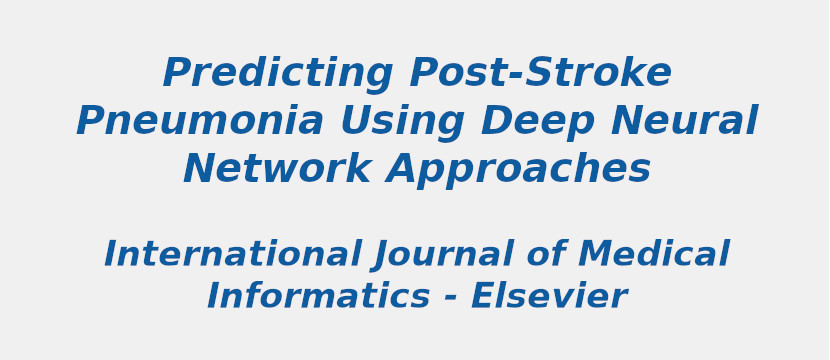Research Area: Machine Learning
Pneumonia is a common complication after stroke, causing an increased length of hospital stay and death. Therefore, the timely and accurate prediction of post-stroke pneumonia would be highly valuable in clinical practice. Previous pneumonia risk score models were often built on simple statistical methods such as logistic regression. This study aims to investigate post-stroke pneumonia prediction models using more advanced machine learning algorithms, specifically deep learning approaches. Using a hospitals electronic health record(EHR) data from 2007-2017, 13,930 eligible patients with acute ischaemic stroke (AIS) were identified to build and evaluate the models (85% of the patients were used for training, and 15% were used for testing). In total, 1012 patients (7.23%) contracted pneumonia during hospitalization. A number of machine learning methods were developed and compared to predict pneumonia in the stroke population in China. In addition to the classic methods (i.e., logistic regression (LR), support vector machines (SVMs), extreme gradient boosting (XGBoost)), methods based on multiple layer perceptron (MLP) neural networks and recurrent neural network (RNNs) (i.e., attention-augmented gated recurrent unit (GRU)) are also implemented to make use of the temporal sequence information in electronic health record (EHR) systems. Prediction models for pneumonia were built for two time windows, i.e., within 7 days and within 14 days after stroke onset. In particular, pneumonia occurring within the 7-day window is considered highly associated with stroke (stroke-associated pneumonia, SAP).
Keywords:
Acute ischaemic stroke
Pneumonia
Machine learning
Deep learning
Author(s) Name: Yanqiu Ge, Qinghua Wang, Honghu WuJia, jing Wang
Journal name: Elsevier International Journal of Medical Informatics
Conferrence name:
Publisher name: Elsevier
DOI: 10.1016/j.ijmedinf.2019.103986
Volume Information: Volume 132
